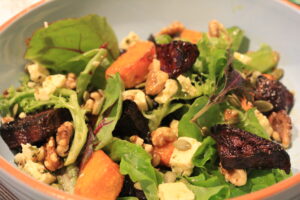Coming out of such a fluey winter this year, some of us barely got a break with the early onset of the hayfever season. This is the time to give ourselves an immune boost and improve our defences against pollens and spring bugs.
Acupuncture and Chinese Herbal Medicine can be used to boost your Wei Qi (defence system), strengthen Lung Qi, and resolve symptoms such as sinus pain, headache, itchy/watery eyes and sneezing. It is best to have treatment to strengthen immunity and prevent hayfever symptoms, but acupuncture is also effective in relieving symptoms once they have taken hold.
You can also boost immunity using nutrition, herbs and supplements:
Vitamin C is important for so many of our body’s functions. It is required for the formation of collagen (the main component of connective tissue in skin, capillary walls, ligaments, cartilage, bones and teeth), wound repair, adrenal function, iron absorption, and of course, immune function. Because it is water soluble, Vitamin C is quickly excreted by the body, which means it essential to replenish through foods and supplementation. Taking 500mg every day over winter and spring as a preventative dose is sufficient. During infection, 500mg every 2-3 hours is safe and effective.
Great food sources of vitamin C include oranges and citrus fruit, kiwi fruit, capsicum, dark leafy greens such as kale and spinach, broccoli, cauliflower, and fresh herbs like thyme, coriander and parsley.
Zinc is a mineral that is required for healthy immune function, hormonal health, blood sugar balance, and the production over 300 enzymes in the body. Food processing and depletion of minerals in our soil means that zinc deficiency is quite common. One of the ways zinc works to support immune function is to weaken viruses so that they cannot spread throughout the nose and throat. One of the best ways to take zinc during illness is in a lozenge or liquid form, so it can make contact with the areas where the virus take hold and proliferates. There are loads of zinc supplements on the market, and they are not all equal. Taking 15-30 mg of zinc in a chelated form is a good preventative dose, but it is very important not to exceed the recommended dose, and do not continue to take Zinc indefinitely.
Foods naturally high in Zinc include oysters and mussels, red meat, pumpkin seeds, sesame seeds and tahini, cacao powder (dark chocolate is great, but not with sugar as it serves as a great food for bacteria).
Garlic has traditionally been used for its healing properties, and now has a wealth of research supporting its benefits. A compound in garlic called allicin, has been shown to have powerful antibacterial and antiviral properties. Supplementing with garlic prevents colds, and shortens the duration of symptoms. Taking an aged garlic preparation is easier on the digestive system, and has less odour. One 30 mg tablet or capsule three times a day is effective for reducing symptoms. Garlic supplementation is contraindicated with some medications and in some medical conditions, so talk to your health care professional before taking supplements.
Eating doses of garlic at a therapeutic level is pretty difficult – it means about 5 crushed raw cloves per day. However, you can still include it in as many meals as possible to enhance overall good health and support healthy immune function. To get the most health benefits from garlic, crush a clove or two and leave it for at least 10 minutes (the air effects the allicin content favourably), and add it to your dish at the end of cooking.
One of the most lovely ways to combat symptoms of colds and hayfever is to brew up a herbal tea. About one-two teaspoons of herb to a cup of boiling water, at least 5 times per day. Make sure you let the herbs brew for 5 minutes before straining. Try one or a combination of the following, adding a squeeze of lemon and a dribble of honey to taste:
Echinacea – antimicrobial, antiseptic, antiviral and a lymphatic cleanser
Yarrow – Dilates blood vessels and helps generate heat throughout the body
Peppermint – antibacterial, helps clear sinuses, soothes aching muscles
Elderflower – anti-catarrhal (helps clear mucous)
Ginger – Anti-inflammatory, pain relieving, helps expel mucous, heats the body
A few extra points to remember: if you are unwell, take time off work and allow your body to rest. ‘Soldiering on’ and repressing symptoms can lead to longer duration of symptoms or a relapse.
Drink plenty of fluids even when the weather is cold. Fluids are essential to help flush and clear out the viruses from our body. Drinking herbal teas, hot water with lemon, and eating nourishing soup is a good way to keep fluid levels up.
Nadia McLeod & Natalie Trevaskis



